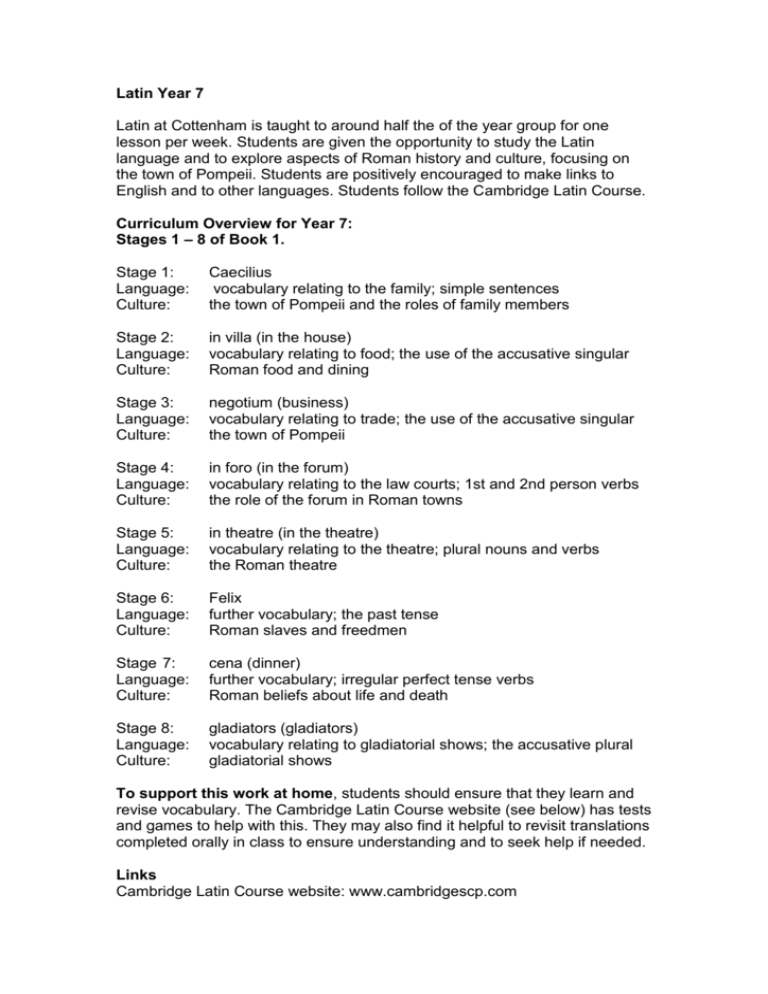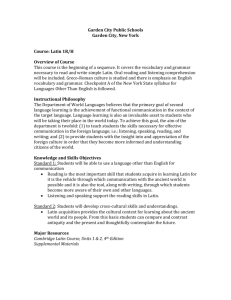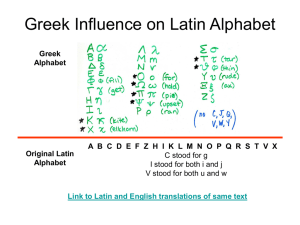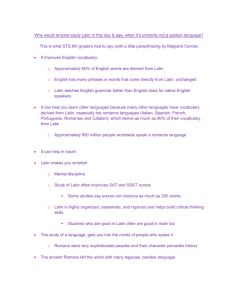Latin Year 7 Latin at Cottenham is taught to around half the of the
advertisement

Latin Year 7 Latin at Cottenham is taught to around half the of the year group for one lesson per week. Students are given the opportunity to study the Latin language and to explore aspects of Roman history and culture, focusing on the town of Pompeii. Students are positively encouraged to make links to English and to other languages. Students follow the Cambridge Latin Course. Curriculum Overview for Year 7: Stages 1 – 8 of Book 1. Stage 1: Language: Culture: Caecilius vocabulary relating to the family; simple sentences the town of Pompeii and the roles of family members Stage 2: Language: Culture: in villa (in the house) vocabulary relating to food; the use of the accusative singular Roman food and dining Stage 3: Language: Culture: negotium (business) vocabulary relating to trade; the use of the accusative singular the town of Pompeii Stage 4: Language: Culture: in foro (in the forum) vocabulary relating to the law courts; 1st and 2nd person verbs the role of the forum in Roman towns Stage 5: Language: Culture: in theatre (in the theatre) vocabulary relating to the theatre; plural nouns and verbs the Roman theatre Stage 6: Language: Culture: Felix further vocabulary; the past tense Roman slaves and freedmen Stage 7: Language: Culture: cena (dinner) further vocabulary; irregular perfect tense verbs Roman beliefs about life and death Stage 8: Language: Culture: gladiators (gladiators) vocabulary relating to gladiatorial shows; the accusative plural gladiatorial shows To support this work at home, students should ensure that they learn and revise vocabulary. The Cambridge Latin Course website (see below) has tests and games to help with this. They may also find it helpful to revisit translations completed orally in class to ensure understanding and to seek help if needed. Links Cambridge Latin Course website: www.cambridgescp.com Latin Year 8 Latin in Y8 is taught as an optional subject at lunchtime, following on from classes in Y7. Students are given the opportunity to study the Latin language and to explore aspects of Roman history and culture, focusing on the town of Pompeii. Students are positively encouraged to make links to English and to other languages. Students continue to follow the Cambridge Latin Course and we aim to finish Book 1 during this year. It is hoped to complete an externally set and moderated test at the end of Y8 for which a certificate will be awarded. Curriculum Overview for Y8: Stages 9 – 12 or Book I Stage 9: Language: Culture: thermae (the baths) further vocabulary; the dative case the baths in Roman towns Stage 10: Language: Culture: rhetor (the teacher) further vocabulary; 1st and 2nd person plural Roman education Stage 11: Language: Culture: candidati (the candidates) further vocabulary; further uses of dative case local government and elections Stage 12: Language: Culture: Versuvius further vocabulary; 1st and 2nd person past tense the destruction and evacuation of Pompeii If time permits, students will move on to Book II, which focuses on life in Roman Britain. To support this work at home, students should ensure that they learn and revise vocabulary. The Cambridge Latin Course website (see below) has tests and games to help with this. They may also find it helpful to revisit translations completed orally in class to ensure understanding and to seek help if needed. Links Cambridge Latin Course website: www.cambridgescp.com Latin GCSE Latin forms the basis, not only of English, but also of other modern European languages, such as French and Spanish. Studying Latin helps students to a greater understanding of other languages, especially their grammar and spelling. The study of Latin not only provides intellectual challenge but it also provides insights into ancient culture and history. Here at Cottenham, we follow the OCR Specification J281, which combines the study of both Latin language and literature. Students follow the Cambridge Latin Course. Assessment There are four exams all taken at the end of Y11: Latin Language 1 (mythology and domestic life) Latin Language 2 (history) Latin Prose Literature Latin Verse Literature There is no coursework or controlled assessment. Curriculum Overview Y10 focuses primarily on building knowledge of Latin vocabulary and grammar. It is an intensive course and the aim is to have completed Books I, II, III and some of Book IV by the end of the year. Book I focuses on the town of Pompeii Book II focuses on life in Roman Britain and in Roman Egypt Book III focuses on again on Roman Britain, especially Bath and Chester Book IV focuses on Ancient Rome itself Aspects of Roman culture are also studied, in part to prepare students for the study of set texts. In Y11, the aim is to consolidate language skills, using Books IV and V alongside practice exam papers and other texts. Students will also study their set texts, both verse and prose, in the original Latin and prepare for examination questions on these. Questions include literary analysis, as well as cultural questions and translation. To support this work at home, students must ensure that they learn and revise vocabulary. The Cambridge Latin Course website (see below) has tests and activities to help with this. GCSE vocabulary lists will be issued at the beginning of Y11. These should be learnt systematically. Grammatical tables appear at the end of the text books. These too need to be studied and revised carefully to aid translation. It is also vital that students consolidate their learning by revisiting translations completed orally in class. They can then seek help with any difficulties. Set texts need to studied and revised particularly carefully, ensuring that translations can be matched with original. Links Cambridge Latin Course website: www.cambridgescp.com OCR (specification and past papers): www.ocr.org.uk/qualifications/type/gcse%5F2012/classics/latin/








